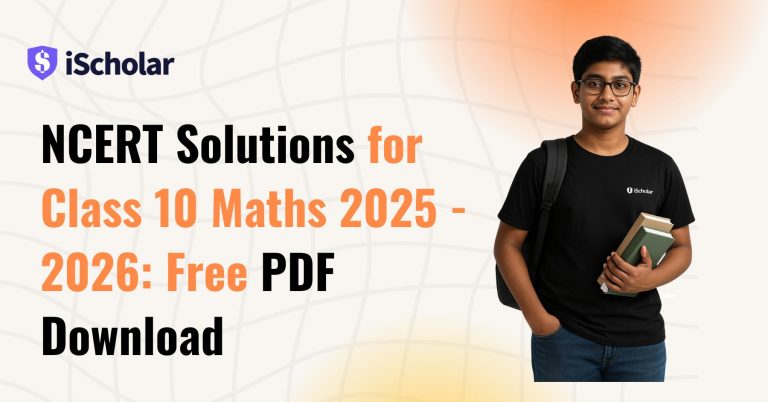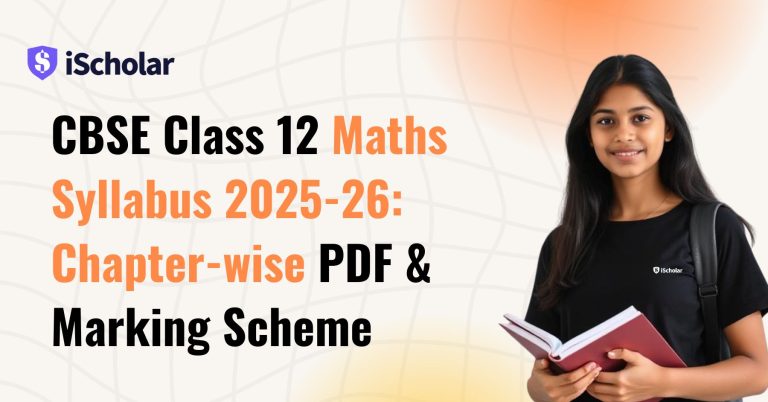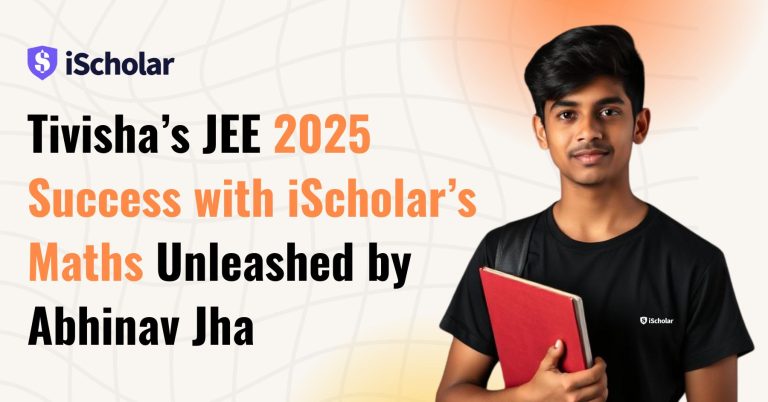The JEE Mains and JEE Advanced aspirants consider maths to be the toughest subject. This subject requires a lot of practice. Conceptual understanding is equally important. There are many formulas in mathematics, and daily practice is inevitable to remember all of them.
You can achieve a good rank in these exams by achieving a decent score in maths, as well as in physics and chemistry. Therefore, it becomes crucial to understand the pattern of JEE maths questions. Practicing mock tests and previous years’ question papers will also boost your confidence.
Maths is a tough subject, but with a methodical approach, a clear understanding of the concepts, and a lot of practice, you can achieve a good score on this subject. This will directly impact your JEE Mains and Advanced scores. Therefore, we recommend candidates spend more time on mathematics from day 1 during their preparation.
How Difficult Is Maths in JEE?
The syllabus of JEE Advanced Mains (B.E/B.Tech) and Advanced has three sections: mathematics, physics, and chemistry. The three sections have equal weightage. However, mathematics plays a crucial role here. Your success in JEE depends a lot on mathematics.
An aspirant with phenomenal mathematical knowledge will definitely have an advantage over others. The subject of mathematics is known as the queen of all sciences. Numerics of physics and chemistry use mathematical concepts. Therefore, a good understanding of quadratic equations, differentiation, trigonometry, and calculus will enhance your knowledge of the respective subjects.
Teachers and aspirants consider mathematics a tough subject in both JEE Main and Advanced. But the only way to overcome this fear is through practice. With systematic practice, following the right study materials and books, recieving proper guidance from teachers, understanding the weightage of topics, and strategic preparation, you can score well on the subject.
Permutations and combinations, quadratic equations, trigonometry, straight lines and circles in coordinate geometry, and differential calculus are easy topics. With some practice, you can easily master these topics..
Permutation and combination, calculus, and differentiation are some of the tough topics in mathematics. Therefore, devote more time to these topics.
Some of the best books for Maths preparation are:
- NCERT Maths 11 and 12 books.
- Class 11th and Class 12th Mathematics, R.D. Sharma.
- Course in Mathematics for IIT JEE, Tata McGraw Hill Publications.
- Problems Plus in IIT Mathematics, A Das Gupta.
- 36 Years’ Chapterwise Solved Papers, Arihant.
Pro Tip:
- After completing each chapter on mathematics, go for the previous year’s question papers in the same chapter.
- Religiously dedicate 3 to 4 hours of your time to maths practice.
- Don’t listen to songs or engage in social media during practice. Keep all your gadgets away.
- Do not consider too many books while practicing a single chapter. This may lead to confusion, as solutions may vary across books.
- Use formula books or create your own document. This will help you to remember formulas. Paste all the important formulas in front of your study area.
What Is the Syllabus of Maths for IIT?
Maths is the toughest section in JEE Advanced. The syllabus is very lengthy too which will require a lot of time and effort. Hence, students must understand first and create an effective preparation plan.
The JEE Advanced 2023 mathematics syllabus is listed below.
- Sets, Relations, and Functions
- Empty, finite, and infinite sets.
- Algebra, intersection, complement, difference, and symmetric difference of sets.
- De-Morgan’s laws.
- Cartesian product of finite sets.
- Relations, domain, and codomain.
- Functions.
- Invertible, even, and odd, into, onto, and one-to-one, special functions.
- Algebra
- Quadratic equations.
- Arithmetic and geometric progressions.
- Arithmetic and geometric means.
- Logarithms and their properties.
- Permutations and combinations.
- Binomial theorem.
- Properties of binomial coefficients.
- Matrices
- Equality of matrices.
- Addition, multiplication by a scalar, and product of matrices.
- Transpose of a matrix.
- Properties of matrix operations.
- Diagonal, symmetric, and skew-symmetric matrices.
- Probability and Statistics
- Random experiment, and sample space.
- Addition and multiplication rules of probability.
- Conditional probability.
- Bayes Theorem.
- Measure of central tendency and dispersion.
- Mean, median, and mode.
- Trigonometry
- Trigonometric functions.
- Periodicity and graphs.
- Inverse trigonometric functions.
- General solution of trigonometric equations.
- Analytical Geometry
- Two-dimensional geometry.
- Cartesian coordinates.
- Straight lines.
- Circles.
- Parabola.
- Ellipse.
- Hyperbola.
- Equations of tangent and normal.
- Locus problems.
- Differential Calculus
- Limit of a function at a real number.
- Continuity.
- L’Hospital rule.
- Continuity of composite functions.
- Derivative of a function.
- Tangents and normals.
- Rolle’s theorem.
- Lagrange’s mean value theorem.
- Derivatives up to order two of implicit functions.
- Integral Calculus
- indefinite integrals.
- Definite integrals.
- Integration by parts.
- integration by the methods of substitution and partial fractions.
- Ordinary differential equations.
- Vectors
- Addition of vectors.
- Scalar multiplication.
- Dot and cross products.
The Pattern of JEE Advanced 2023 Mathematics, Paper 1
| Sections | The type of question | Total number of questions from each section | Total marks |
| Section 1 | MCQ questions with a single correct option. | 6 | 18 |
| Section 2 | Questions with the single correct option. | 6 | 24 |
| Section 3 | Questions that have numerical value answers. | 6 | 24 |
The Pattern of JEE Advanced 2023 Mathematics, Paper 2
| Sections | The type of question | Total number of questions from each section | Total marks |
| Section 1 | MCQ questions one or more correct answers. | 6 | 24 |
| Section 2 | Questions that have numerical value answers. | 6 | 24 |
| Section 3 | Questions with single-digit integer answers. | 6 | 18 |
No of Questions in JEE Mains
We have listed the number of questions and other important details in the table:
| Examination mode | Computer-based test(CBT) for B.E/B. Tech and B.Plan (except drawing section). |
| Duration of the exam (B.E/B.Tech, B.Arch, and B.Planning) | 1. 3 hours 2. 4 hours for PWD candidates |
| Medium of examination | All important Indian official languages. |
| Type of questions | 1. MCQs 2. Questions with numerical value options |
| Total sections | Physics, chemistry, and mathematics. |
| Total marks | 1. B.E/B.Tech: 300 2. B.Arch: 400 3. B.Planning: 400 |
| Total questions in each section | 1. Total 75 questions in the entire paper 2. 25 questions from each section of mathematics, physics, and chemistry. |
| Mathematics questions in JEE Main 2023 | 1. Total 25 questions. 2. Total marks in mathematics section: 100. 3. Section A, MCQ questions: 20 questions. 4. Section B, numerical value questions: 10 questions. 5. Candidates can attempt any five questions out of the 10 questions in section B. |
FAQ: JEE Maths Questions
JEE Mains maths questions pdf
You can find JEE Mains maths questions on the official website of the National Testing Agency (NTA), which conducts the JEE Mains examination. You can also find previous year’s question papers and sample papers in bookstores or online.
What is a good score in JEE maths?
A good score in JEE Mains maths will be above 80.
Is maths tough in IIT?
Yes, most of the candidates consider maths a tough subject in JEE Advanced. It has a huge syllabus and requires a lot of practice. Trends from previous years predict that candidates relatively score less in mathematics compared to physics and chemistry. Therefore, make it a point to devote maximum time to maths preparation from day 1.
JEE Maths questions chapter wise
The JEE Main Chapterwise Mathematics by Arihant Publications is very good for practice. It contains chapter-wise solutions to questions from the year 2002-2021.
Wrapping Up
Maths is a complex subject for some candidates. However, it can be interesting for many others. It all depends on your understanding of concepts and practice.
To excel in JEE Mains and Advanced, an aspirant must devote maximum amount of time to this subject. The keys to achieving a high score in mathematics are sincerity, consistency, and practice.. Practice a lot of previous year’s JEE maths questions. This will give you an idea of the question pattern and boost your confidence on exam day.





